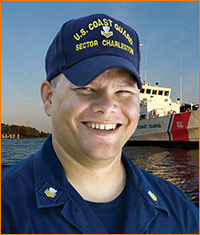2008 Coastguardsman of the Year
winner

Marine Science Technician 1st Class Anthony Clark
Prior service as an Army reservist; he and wife Elisa have three sons and two daughters.
CHARLESTON, S.C.—Anthony Clark's story is a tale of extremes.
In 2007, Clark, a Coast Guard marine science technician first class, went from an assignment in Alaska to the deserts of Iraq, from familiar shipmates to the military branch perhaps least like his own: the Army.
But not only did Clark survive his hitch as a sand Coastie, he thrived. By the time he left Iraq for his current job, as an inspector with Coast Guard Sector Charleston, S.C., Clark was the most sought-after expert in Iraq on hazardous materials, his commander said.
A native of Cleveland and an Army reservist before joining the Coast Guard, Clark's assignments in Alaska included patrolling the harbor in Juneau and helping to train Coast Guard auxiliarists, the civilians who volunteer their time and boats to work with the Coast Guard in lake and harbor patrols.
"When I first got that duty, I dreaded it," Clark said. "I thought, 'oh no,' but as it turned out, I completely loved it. I had a lot of fun with them. A lot of them were more eager to learn than a regular Coast Guard person."
But between the end of his time in Alaska and a scheduled move to Coast Guard Sector Charleston, S.C., Clark got word of a Coast Guard solicitation looking for people to volunteer to go to Iraq. He signed up.
The billet was attached to Redeployment Assistance and Inspection Detachment IV, and it would involve training Army units shipping back to the U.S. in how to pack their hazardous materials safely for the transit. From his port security work, Clark was already qualified in dealing with hazardous materials, so he helped train his squadmates before they all deployed in June.
The Army job was "a lot of long days and a lot of travel," Clark said. "I traveled all over Iraq—there's probably not a forward operating base I haven't been to—but at the same time, it was rewarding." Sixteen and 20-hour days were common, he said, seven days a week. Rocket and mortar attacks were a constant hazard.
Clark and his team trained soldiers, inspected containers and became the top group of their kind in Iraq, said Clark's Army commander, Lt. Col. Christopher Houston.
"At the time of his departure, [Clark] was the most sought-after hazmat authority in Iraq. It was a reputation he earned in every way," Houston said.
Army units sought Clark and his RAID IV team for training in how to pack up equipment considered "hazardous" for shipment back to the U.S., including nuclear, biological and chemical suits, unused diesel fuel, batteries, and other gear.
By October, Clark's time in Iraq was up, and his command in Charleston needed him. So he reported to the assignment in which he's been serving since, as the leading petty officer of the waterways management division for Coast Guard Sector Charleston. He's back to training junior maritime inspectors, working with the shipping industry and checking the thousands of containers that come each day into the Charleston's post. But that might not last much longer—Clark has volunteered to go back to Iraq.
It's all in the interest of keeping things interesting as he continues to ascend the Coast Guard ladder, Clark said. Reaching the top, for him, would mean becoming the service's top enlisted leader, master chief petty officer of the Coast Guard.
"I don't ever want to see myself sitting stagnant and just doing a job, to the point that it becomes nothing more than a job," he said. "Right now, this [the Coast Guard] is the only job I could say that I actually love. If I'm going to do something here, I'm going to do it the best I can."
